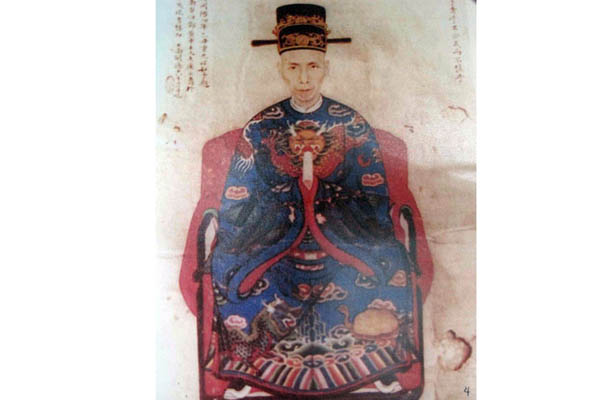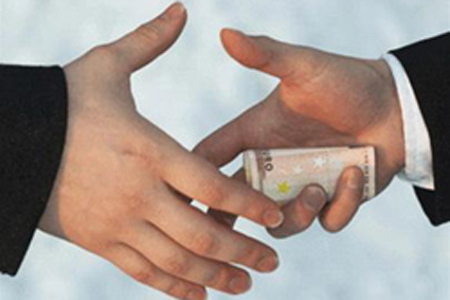In many Third World countries a vigorous and. alas, seemingly little effective campaign against corruption has been going on. This endemic evil which does not spare even the richest countries of the world dates back long, long ago.
It may be interesting to know what our forefathers thought about it over a century ago. Some information may be drawn from a book written in classical Chinese in 1863 and recently translated into Scientific Vocabulary (Danh tu khoa hoc) laid the foundations for scientific research and teaching in the Vietnamese language. Under the the vernacular, the author is a Confucian scholar who holds rather strong views about the problem.
Dang Huy Tru (1825-1874) was a man of learning and conscience who stood apart from most of his contemporaries by his open - mind-edness and his understanding of economics. Having received a doctor’s degree at the literary examination, he was entrusted with high mandarinal functions and on three occasions was dismissed from public office on account of his uncompromising uprightness. Appointed civil administrator, royal censor, academician, he was at one time put in charge of trade with the Chinese province of Guangdong (Kwangtung).

He opened many trading posts and introduced photography into Viet- nam. He made visits to Guangzhow (Kwangchow), Hongkong, Macao. When French troops seized Hanoi in 1873, he was entrusted, together with a military mandarin, with setting up a base of resistance in the northern uplands. But soon after, he died of illness leaving behind an abundant legacy of literary works on a variety of subjects - education, morals, military art - in addition to poems and memoirs.
Confucian in the best sense of the word. Dang Huy Tru wrote for use of mandarins a "Handbook of principles governing the acceptance and refusal of gifts" (Tu thu yeu qui). In his view, to be a mandarin means to be a servant of the people, to be "the son of the lowly people" (thu dan chi tu) or to be "the people’s dog and horse" (khuyen ma).
In the book's introduction, he makes a comparison between Chinese and Vietnamese mandarins. The Chinese empire being vast rich, the salary and other emoluments received by even so modest as a district mandarin are quite enough for his own upkeep and that of his extended family. By contrast, Vietnam is but a narrow strip of land along the coast, the fertile fields in the south having been occupied by the French. Even driven by the best intentions, the Court cannot offer a decent pay to its officials. A first-rank mandarin receives only about three-tenths of the pay of a Chinese district mandarin. Worse still, grave events have forced the King to cut back the salaries of his officials. Some mandarins have received no pay at all for the whole year on account of deficits in the local budget. On the other hand, nohless oblige. A man in the service of the King cannot be clothed in rags; he must give a decent reception on festive days and on the anniversary days of his ancestors.
How to resolve the dilemma: to keep one's integrity while meeting one's social obligations?
Dang Huy Tru’s option is both realistic and based on moral purity. In a recourse to casuistry, he maintains that the mandarin is duty bound to refuse "bribes", but can accept gifts stemming from pure gratitude.
He lists 104 cases where refusal is obligatory, drawing them from various fields: education, politics, economics, culture, society. He analyses each case, gives comments, and cites examples taken from ancient history. Here are a few typical examples of cases where refusal is obligatory: gift of a candidate to an examiner, gift to an inspector, gift offered by foreign traders expecting favors in return, gift offered by a merchant hoping for a tax reduction, grift offered in the hope of obtaining a part in the redistribution of communal rice fields, gift offered by the population of a village hoping to be exempted from dyke-maintenance labor, gift offered to a judge in the hope of obtaining his leniency, gift aimed at justifying the granting of a divorce...
Against those 104 cases of refusal, the author tolerates only five cases of acceptance of a gift: gift offered on the occasion of the ritual festivals of the year (Tet or lunar New Year, harvest festival...); gift offered by someone to whom one has rendered a service by resolving an affair in a just manner; gift offered by someone to whose legitimate promotion one has lent support; gift in kind offered by people engaged in, north-south maritime trading (to thank local authorities for ensuring safe passage through their territory); gift to celebrate a happy event (ambassadorial mission, promotion...) or a solemn ceremony (funeral or death anniversary of one’s parents).
What do today’s jurists think of those recommendations made by a mandarin official a century ago?...



